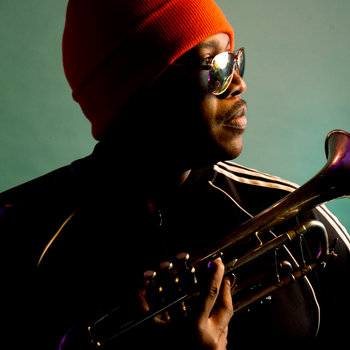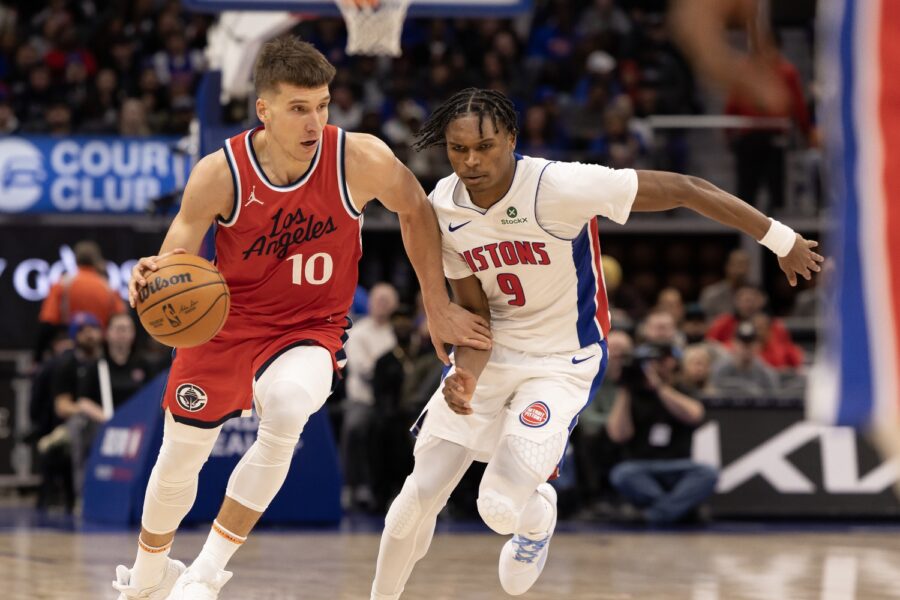
When Leron Thomas made his debut as Pan Amsterdam with the single “Plus One” in 2018, he began the track by saying, “I’d like to introduce myself, but I don’t think I should. You may never hear about me again.” In the seven years since his reluctant introduction on The Pocket Watch LP, Pan Amsterdam has gone from enigma to resurrector, breathing new life into the erstwhile trumpeter’s career. What began with one simple song about guest list requests has led to tours with Open Mike Eagle, an album with Damu The Fudgemunk, and Iggy Pop proclaiming himself to be the number one Pan Amsterdam fan. When asked if creating the Pan Amsterdam identity was liberating, he answers without hesitation: “It felt like a muzzle had been lifted off my mouth.”
“There was a lot of politics in jazz that I actually caught the short end of the stick of,” he says of his jazz career prior to Pan Amsterdam. “And there was a lot of corruption and a lot of things going on that kind of pains me to think about a bit. It was a tough time for me around those years.” Just as MF DOOM was Daniel Dumile’s vehicle to destroy a rap industry that had forsaken him, Thomas designed Pan Amsterdam as a secret identity to diss the jazz police. It’s a revenge fantasy born of feeling powerless. “There’s a lot that is not addressed on the way Black talent is squandered [in the industry],” Thomas says. “That’s a damn shame, man.”


Thomas didn’t always feel so negatively about jazz and hip-hop—or about music in general. He arrived in New York City from Houston as a prodigy, alongside another Houston prodigy who hailed from the same high school: Robert Glasper. Both musicians arrived at The New School in the late 1990s. Of that era, Thomas remembers having friendly debates with Glasper about their all-time favorite jazz musicians, making quick connections with artists like Bilal and the Soulquarians, and moving through showcases and jam sessions. He studied jazz and contemporary music by day, receiving instructions from legends like Strata-East co-founder Charles Tolliver, and then pulled all-nighters at jazz clubs like Smalls in the West Village. Often, he’d get a few hours’ rest and head straight to class still smelling like the night before. “That’s back in the days when Smalls was open until like eight in the morning,” he says. “And I would hang there, and I crashed at Smalls, and I would go to class again smelling like beer from the couches. I didn’t give a shit.”
In other words, he was in it, and his elders in the New York jazz scene were taking notice. He was invited to join Billy Harper’s band—a lineage that traces back to Art Blakey and the Jazz Messengers—played with Bobby Watson, and was mentored by Roy Hargrove, all before graduating in 2003. How did he endear himself to his elders so quickly? “Play a good solo,” he says. “You get treated with more information if you play a good solo.” But that information wasn’t a showering of praise—it was instead critical advice. “They tell you, man. ‘You’re playing very informative, but you ain’t saying nothing.’”
That balance of encouragement and accountability (read: being called out if he sounded too much like Charlie Parker) gave Thomas the tools he needed in order to find his own voice. For Thomas, it always came back to a Miles Davis quote: “Sometimes it takes you a long time to sound like yourself.” He recalls one night in 2002 at Roy Hargrove’s series The Trumpet Shall Sound at the Jazz Gallery as an early confirmation that his dedication was paying off. The Trumpet Shall Sound regularly invited promising young horn players to flex their chops alongside Hargrove’s band. Thomas made an impression, and Hargrove singled him out on stage, letting the young trumpeter know he was on the right path. The showcase was written up in the New York Times’s Pop and Jazz Guide by journalist Ben Ratliff, who became a reliable confidant and supporter.
Thomas’s proximity to Glasper was also leading to gigs outside of jazz. When Glasper recorded parts of soul singer (and fellow New School undergrad) Bilal’s 2001 solo debut 1st Born Second, Thomas joined the touring band—which included a stint as the opening act on Erykah Badu’s Mama’s Gun World Tour. When Bilal joined the Soulquarians in Electric Lady Studios to record his 2003 sophomore album Love For Sale—coinciding with a legendary run of records by The Roots, Common, and D’Angelo—Thomas was in the booth adding horns. The energy and notoriety he was receiving, both in and outside of the jazz scene, had him primed to pursue a solo career.
In fact, in many ways, Glasper and Thomas could appear as if they were on parallel tracks: Two forces moving in tandem, but with different approaches to their solo albums. In retrospect, the jazz standards that anchored Glasper’s 2002 debut Mood provided him with an on-ramp to Blue Note Records, which in 2005 released Canvas, The album was critically panned, and Glasper ultimately course-corrected toward the audience he had garnered through the Soulquarians. In My Element, released two years later, offered post-bop interpretations of Herbie Hancock, Dilla, and Radiohead. Leron Thomas also had meetings with Eli Wolf, Blue Note Records’ Senior Director of A&R, but his recordings offered no compromises. His lo-fi jazz mixtape Dirty Draws Pt.1 from 2005 was loaded with juvenile humor and crude, Kool Keith-y confessions—not to mention a noticeable lack of horns on his part. “We grew up in the hip-hop era,” he says. “These execs, these A&Rs, all these people weren’t ready for that, man. They weren’t ready for our experiences.”
The record labels and the clubs still expected an antiquated, clean-cut idea of the jazz musician. For Thomas, it was stifling and regressive. He grew up in the South. His grandmother listened to Lightnin’ Hopkins in the house. He saw Juvenile perform “Ha” in Houston to 20 people. He studied the downtown NYC punk scene. Bilal introduced him to the music of Frank Zappa. He wanted to make music that wove together those disparate interests. According to Thomas, Blue Note was politely not interested. “I remember Blue Note was just like, ‘You got a real gumbo of things happening here. And it’s not Blue Note material.’ I’m like, ‘Well, what is Blue Note material, motherfucker?’”

On stage at jazz clubs, Thomas felt like a made man, and the press was anointing him a horn player to watch. But, in the studio, he was writing songs that sounded like R.E.M. and Chris Rock’s “No Sex (In the Champagne Room),” and he’d often put both of them on the same album. In jam sessions, he started playing loud, real loud, “and flat, and horrible.” As he remembers it, “I played a lot of licks. And a lot of that had to do with the fact that I just didn’t feel like I was expressing myself.” He could still feel the radical expression in jazz, but he couldn’t tap into it. When confronted in jam sessions with horn players who could duplicate the radicalism he desired, he’d play even louder until he noticed dirty looks from the other players. It weighed on him. He saw the jazz scene as cliques with competing turf, and he felt increasingly unwelcome or disinterested in it. Eventually, it reached a breaking point. “There was a time where I couldn’t even hear jazz anymore,” he says. “I didn’t wanna listen to it.”
The myth of Pan Amsterdam was born in the liner notes of his early albums, telling the story of a John Doe who washed ashore in Miami with amnesia. The only leads to his identity suggest that he might be a missing trumpet player who fell off a neo-soul and smooth jazz cruise ship. And on that debut single “Plus One,” the rapper specifically asks for a guest list at The Vanguard—a jazz club—rather than venues more synonymous with hip-hop. Other details like, “Can’t tell if my accent is from Brooklyn or Jersey” and his pronunciation of cilantro offer only red herrings.
The most revealing detail to his identity comes on “Landlord Elijah” from The Pocket Watch, his debut full-length as Pan Amsterdam. The backstory feels true to Thomas’s search for reinvention: In the song, he and his wife, who’s a nurse for disabled adults, live in squalor uptown. He’s begging for gigs and watching his exes become managers of younger, more successful musicians. It all weighs heavily over a sample that repeats the words “every day” over and over, like a punishment. At the conclusion of the song, Thomas raps: “A jazz musician died and Pan Am was born.”
In 2017, one year before Pan Am’s debut, Thomas was ready to end his status as a New Yorker, realizing that he was “approaching 20 years of living in NYC and had nothing to show for it.” A decade-long relationship had ended, and he couldn’t make rent on his own. He was considering moving back to Houston. While thinking over his options, buzzed on red wine, he wrote to Ben Ratliff to thank him for the past support, and asked if he could buy Ratliff a beer. It was a Hail Mary. During their hang, Ratliff asked about new music, and Thomas sent him “Plus One.” Two months later, Ratliff called with life-altering news: Iggy Pop was a fan and would be playing the song on his BBC Radio 6 show Iggy Confidential. It led to Pan Am and Iggy joining forces on “Mobile,” where Iggy shares his gas station order and Pan Am wails on the horn over sparse 808s, grunge riffs, and claps. “Things escalated quickly from there, and we ended up working on his album Free,” he says. “By the end of 2018, I got a call from Iggy’s manager asking if I would be interested in working in Iggy’s band. I was—and still am—over the moon!”
The invention of Pan Amsterdam gave Thomas a new freedom. It provided armor against the pain of being shunned as a jazz musician, while reintroducing Thomas on new terms to a new audience. In the off-hours of his world tour with Iggy Pop, Thomas wrote and recorded his sophomore album, 2020’s Ha Chu, for UK label Def Pressé. Where The Pocket Watch shyly hid his horn in the texture of the beat, Ha Chu created a conversational role for his solos. His confrontational verses elevated his bravado, but were counterbalanced by tracks like the cautionary “Script.” The interludes were built from field recordings of a tea time with Iggy, and a press interview over crispy duck in a Chinese restaurant. They gave the album an ambiance of both success and reflection. Thomas’s newfound maturity is reflected in one such interlude, telling a journalist, “You don’t need to keep fighting, getting into 40 years old, you know. You need to see what’s going to build, what’s growing, and move with that.” And album closer “The New York Hustle” finds him getting his shots in at being pigeonholed by the jazz police.
For Def Pressé founder Matt Moat, Thomas’s criticism of jazz is less about the music and more about being “angry with rules—any rules,” he says. “That includes categories, genres, the ‘You shouldn’t challenge this.’ He’s stupidly brave. To a fault.” It was Moat’s suggestion that Thomas record an album with a fellow Def Pressé artist, the D.C.-based producer Damu The Fudgemunk. Damu’s past collaborations with Archie Shepp, as well as an album on which he sourced beats from the KPM library, might have suggested a jazzier Pan Amsterdam record was in the works; instead, on EAT the two leaned into the heady, vinyl crackle of ‘90s boom-bap—more Boot Camp Clique than Jazzamatazz.
Except, that is, when Thomas let his horn do the talking on instrumental tracks “Blue Agave” and “All Purpose Sauce.” Never flat and never too loud, the trumpet is instead full of joy—dynamic and expressive. In fact, Thomas felt so in his bag that he purposely cut “Blue Agave” short before he started to showboat “I stopped that shit and I left it,” he says with a laugh. “I left it awkward, too. I left it like that, ‘cause I thought that was honest.”
One afternoon, Thomas got a phone call from Iggy Pop. The Stooges frontman wanted permission to record a cover of “Plus One,” still not done with his favorite song. “The weirdest shit in the world,” he says. “He just called me one day. ‘Hey, I want to do “Plus One.” Can you send me the lyrics?’” Iggy’s take on “Plus One” found a home on Confines, Pan Amsterdam’s debut for Heavenly Recordings. On an album that refutes the restrictions of genre, Iggy’s version treats Pan Amsterdam’s original like it’s a jazz standard. Over ominous keys and synthesizers, he flips it into beat poetry, his gravelly voice making subtle, personal changes like, “can’t tell if my accent is Michigan or Jersey.” Elsewhere, Pan Amsterdam tinkers with his own material. A previous nu-disco collaboration with Metronomy on Ninja Tune called “Nice Town” becomes a moody alt-rock song called “NYC Town,” while “Day Out” revisits an old collaboration with French funk band Cotonete. But, Pan Amsterdam has not collapsed into himself. Confines is not a prison. Leron Thomas concludes the record with an explosive, liberated crescendo, where his horn shimmers and glows with warmth. The moment marks the return of Pan Amsterdam’s first love.
“I just started listening to jazz again,” he says, confirming. Then he adds: “I’ll probably do a jazz album.”









